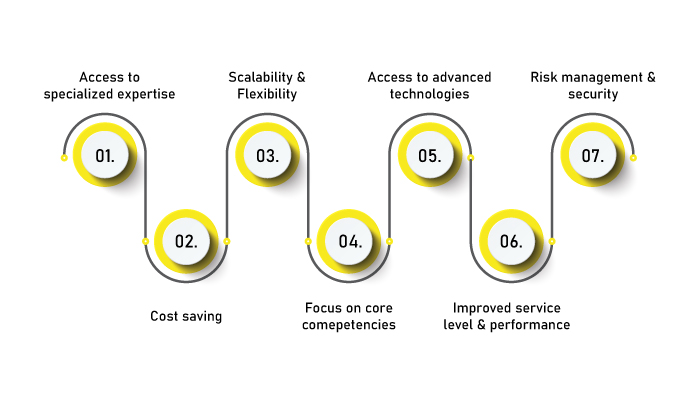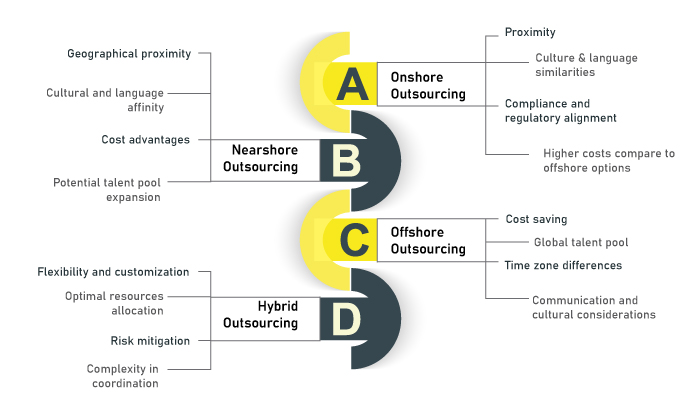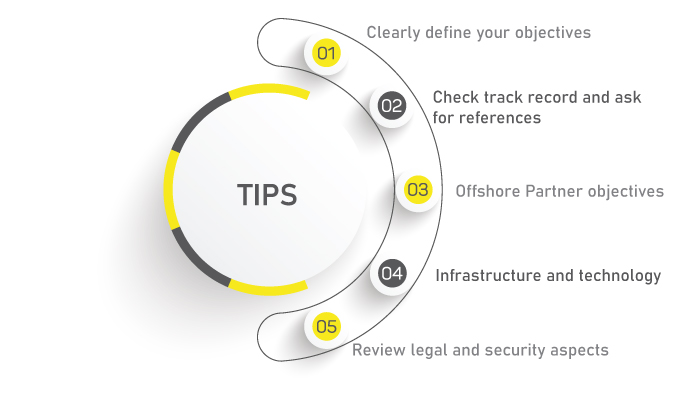IT outsourcing partner is no longer just a trend, it is an integral part of the way smart businesses operate today.
Businesses focus on their core competencies while leveraging external expertise to handle non-core functions. This can lead to the widespread adoption of IT outsourcing, a strategic practice that allows companies to delegate their technology-related tasks to specialized service providers.
By partnering with an IT outsourcing company, businesses can access top-notch skills, reduce, costs and gain a competitive edge in the never–ending evolving digital realm.
However, selecting the right IT sourcing partner is a critical decision that can significantly impact the success of your organization. According to the report, global spending on outsourcing could hit $731Bn in 2023.
It is said when it comes to outsourcing services, India is the main outsourcing hub in the entire Asia.
How can you navigate through the sea of options and choose the best fit for your specific needs?
That’s precisely what this guide aims to help you with.
Whether you’re a start-up seeking to optimize your resources or an established enterprise looking to scale operations. We will help you in finding the right IT outsourcing partner for you.
So without further ado! Let’s Go
What Is IT Outsourcing Partner?
IT outsourcing services is a specialized service provider that assists organizations in managing and executing their information technology functions.
They offer a range of IT services, such as software development, system integration, infrastructure management, network administration, cyber security, cloud computing, data analytics, and technical support.
Engaging an IT outsourcing partner allows businesses to leverage external expertise, access cutting-edge technologies, and optimize their IT operations. Without the need to maintain an in-house IT department. And For that reason outsourcing is trending.
This partnership can help organizations streamline processes, improve efficiency, reduce costs, and stay competitive in the rapidly evolving digital landscape.
Why Choose An IT Outsourcing Service?

As we are moving with tech evolution at a very fast pace, IT Outsourcing is a blessing for many businesses. As businesses look to scale or expand through outsourcing, it is critical to choose the best tech partner that understands your business needs.
50% of the organization turns to outsourcing for innovation, with additional benefits coming from reduced capacity issues, cost savings, and many more.
Organizations get many benefits as they can align with a talent pool of people, skills, and services. That is beneficial for transforming their business outcomes.
Choosing an IT outsourcing partner has several benefits it offers several compelling advantages for businesses.
Here are some key reasons why organizations opt for IT outsourcing:
Access to specialized expertise
IT outsourcing service providers are typically experts in their respective fields. By partnering with expert developers businesses partner with skilled professionals who are professionals in their respective fields.
With this, businesses tap into the expertise they may not have in-house, ensuring high-quality work and optimal outcomes.
Cost saving
One of the main reasons to choose IT outsourcing is cost saving. With this companies don’t need to invest in the in-house team structure.
However, IT outsourcing operates at lower costs due to economies of scale that can reduce overall expenses.
Scalability and flexibility
They provide flexibility and scalability to businesses to scale their IT resources according to their specific needs.
Whether it’s scaling up during periods of high demand or scaling down during slower periods.
Focus on core competencies
The best thing about outsourcing services is they allow businesses to focus on their core competencies and strategic initiatives.
As they offload non-core IT tasks to external experts, organizations can concentrate their initial resources and efforts on activities that directly contribute to their core business objective.
This significantly increases productivity, innovation, and competitiveness.
Access to advanced technologies
Keeping up with the latest trend and technologies can be challenging for organizations, especially for those lacking specialized IT knowledge.
By partnering with them businesses can leverage advanced technologies without the need for substantial investments in acquiring and maintaining them in-house.
Improved service level and performance
This is the main reason for choosing an Outsourcing company as they operate under service level agreements (SLAs) that define performance standards and metrics.
With this businesses get a high level of quality services within the agreed timeline.
Risk management and security
The outsourcing service provider typically has robust security measures and protocols in place to protect data and mitigate risks.
With this, they stay updated with the latest security practices, regulations, and compliance requirements and reduce the burden on businesses. This ensures data protection and regulatory compliance. So outsourced it, without any fear.
Different Types Of It Outsourcing Models

When you choose IT support outsourcing, there are various models to choose from each one offers unique advantages.
According to Grandview research, the global business process outsourcing market is expected to reach $525 Bn by 2030.
This show, IT outsourcing models are expected to be the biggest in terms of growth.
Here are a few outsourcing models to consider:
Onshore outsourcing
Onshore outsourcing is also called domestic outsourcing. It involves contracting an external service provider within the same country as the client’s business.
Proximity
As the outsourcing country is located in the same country, it results in easier collaboration, minimum time zone difference, and better communication.
Cultural and language similarities
This minimizes language and cultural barriers since the service provider operates within the same cultural and linguistic context.
Compliance and regulatory alignment
The service provider is well versed in local laws, industry standards, regulations, and reducing legal risks.
Higher costs compare to offshore options
Onshore outsourcing tends to have higher labor costs compared to offshore options due to factors such as local wages and operating expenses.
Nearshore outsourcing
It involves contracting an external service provider in a neighboring or nearby country. Usually within the same region or time zone. Key points about nearshore outsourcing include:
Geographical proximity
The outsourcing provider is located in a neighboring or nearby country. It allows for more frequent in-person meetings and smoother collaboration.
Cultural and language affinity
It often provides a closer cultural and language match compared to offshore outsourcing, facilitating effective communication and understanding.
Cost advantages
Compared to onshore outsourcing, it provides the best. As labor costs in neighboring countries may be lower while maintaining proximity and cultural alignment.
Potential talent pool expansion
It provides access to a wider talent pool with diverse skills and expertise from neighboring countries, enabling businesses to find the right resources for their needs.
Offshore outsourcing
When it comes to offshore outsourcing it involves contracting an external service provider located in a different country, typically in a distant geographical region.
Cost savings
It is often chosen for its cost advantages due to lower labor costs in the outsourcing destination compared to the client’s home country.
Global talent pool
It allows businesses to tap into a vast talent pool worldwide. And, it gains access to specialized skills and expertise that may be scarce locally.
Time zone differences
Offshore outsourcing may involve significant time zone differences, which can be leveraged to achieve round-the-clock productivity and faster project turnaround.
Communication and cultural considerations
Effective communication and managing cultural differences can be important challenges in offshore outsourcing relationships. When it comes to cultural consideration establishing efficient communication channels is critical for success.
Hybrid outsourcing
Hybrid outsourcing combines multiple outsourcing models to create a customized approach that best fits the client’s requirements.
Moreover, it involves a mix of onshore, nearshore, or offshore resources and services.
Flexibility and customization
It offers the flexibility to select the most suitable sourcing model for each aspect of the business or project, considering factors such as cost, proximity, skill requirements, and project complexity.
Optimal resources allocation
Businesses can strategically allocate resources based on the specific needs of different projects or functions, leveraging both in-house and outsourced teams to achieve efficiency and cost-effectiveness.
Risk mitigation
By diversifying the outsourcing approach, businesses can mitigate risks associated with single-sourcing models such as excessive reliance on a single vendor or geographic location.
Complexity in coordination
Managing multiple outsourcing relationships and ensuring seamless coordination across different providers and locations can add complexity to project management and communication.
Tips To Keep In Mind Before You Start Looking For Outsourcing Partner

Choosing the right IT outsourcing company will save you tons of money and time.
Before you begin your search for an outsourcing partner, keep the following tips in mind:
Clearly define your objectives
When you outsourced its support have a clear understanding of your projects and goals, scope, and expected outcomes. This will help you communicate your requirements effectively to potential partners.
Check track record and ask for references
Just look for a provider that has an established reputation that relates to the organization’s niche. You have to trust your outsourcing partner completely as it can be possible only by checking their preferences.
Ask their previous client project details and contact them, in this way, you’ll find crucial information about them. Plus, before finalizing the partner make sure to ask for references from your offshore partner.
Offshore Partner objectives
Choose the outsourcing partner that has the same objective as you. Now you are wondering how you find this in one go.
As a business, you need to check that the business objective of your outsourcing partner is the same as yours. Make sure the communication is transparent and business objectives are clear from the start.
Infrastructure and technology
Make sure that they have the right outsourcing IT infrastructure and technology that is good for your business growth. Don’t go for companies whose infrastructure is not reliable.
In addition, ask for data security compliance and training protocols your provider uses. If they are genuine organizations they will be happy to share how they ensure data privacy and keeping their information safe.
Review legal and security aspects
Ensure that your outsourcing partner operates within legal frameworks and complies with relevant regulations such as data protection and privacy laws.
You can do this by, reviewing their legal contract and agreements to clarify ownership of intellectual property rights and establish confidentiality clauses.
Find out if your outsourcing partner provides post-development support
Lastly and most importantly evaluate their data encryption protocols, access controls, disaster recovery plans, and overall cyber security posture. Assess their compliance with international security standards and certification.
Moreover, determine whether the outsourcing partner offers post-development support services. This includes maintenance, bug fixes, updates, and ongoing technical assistance.
Just clarify the terms, duration, and costs associated with post-development support to ensure smooth operation and timely issue resolution.
Conclusion
Building a business solution, you have two options: In-house team or outsource the project.
Choosing the best IT outsourcing partner requires careful considerations which we have discussed in this blog.
Outsourcing can significantly enhance business growth and efficiency, as demonstrated by successful companies like Github, Skype, and Slack. To follow their lead, consider the key factors mentioned in the blog while selecting an outsourcing partner for your next project or business idea.
FAQ
Consider their expertise, experience, reputation, communication capabilities, security measures, scalability, and cultural fit with your organization.
Review their portfolio, case studies, client testimonials, certifications, and industry recognition to gauge their technical proficiency and domain knowledge.
Experience indicates their ability to handle complex projects, overcome challenges, and provide effective solutions based on lessons learned from previous engagements.
A partner with a strong reputation demonstrates reliability, trustworthiness, and quality service delivery, reducing risks and ensuring a positive working relationship.
Clear and efficient communication is vital for collaboration, project understanding, issue resolution, and maintaining alignment between your business objectives and the outsourced team.
Ensure they follow industry-standard security practices, have robust data protection policies, employ secure infrastructure, and adhere to regulatory compliance requirements.
Your outsourcing needs may evolve over time. Ensure the partner has the resources, flexibility, and infrastructure to accommodate growth or changing project requirements.
Evaluate their values, work culture, and communication style to ensure compatibility with your organization’s values, processes, and work environment.

Udai Singh is a senior content writer with over 6 years of experience in creating content for FinTech, eWallet, EdTech, and App Development. He is an expert in simplifying complex concepts and creating engaging content that resonates with the audience.
Table of Contents












No Comments
Comments are closed.